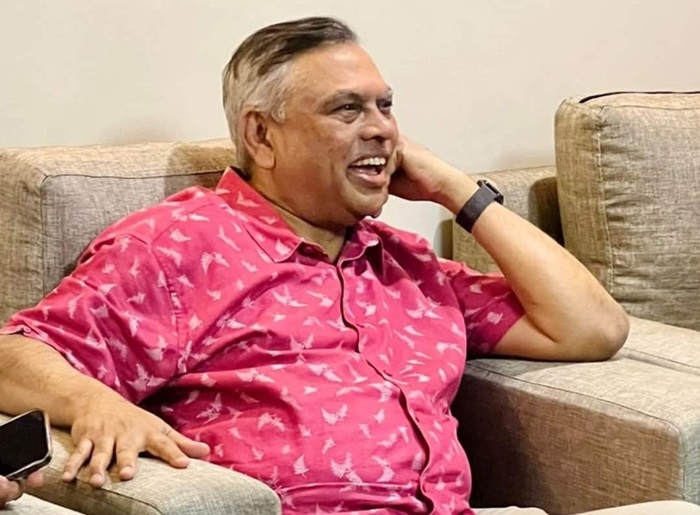-By A Special Correspondent

(Lanka-e-News -02.Feb.2025, 11.20 PM) A startling revelation has emerged through the statement of Asad Maulana, shedding light on an alleged covert operation involving high-ranking Sri Lankan political figures, intelligence operatives, and the shadowy undercurrents of geopolitical maneuvering.
According to Maulana, Basil Rajapaksa, a key figure in the Rajapaksa political dynasty, personally introduced Mrs. Prabha Murthy, an officer of India’s Research and Analysis Wing (RAW), to Sivanesathurai Chandrakanthan, better known as Pillaiyaan in August 2008. The meeting, which took place in Rajapaksa’s private room, was reportedly centered around discussions on eliminating Vinayagamoorthy Muralitharan (commonly known as Karuna Amman) from the eastern anti-LTTE operations and positioning Pillaiyaan as the new leader of the faction.
Karuna Amman, a former LTTE commander who defected to the government’s side in 2004, played a crucial role in dismantling the Tamil Tigers' control over the Eastern Province. However, Asad Maulana claims that RAW sought to push Karuna aside and elevate Pillaiyaan as their preferred operative, further tightening Indian influence in Sri Lanka’s internal security affairs.
The involvement of RAW in Sri Lanka is not unprecedented. India has been deeply entwined in the island nation’s civil conflict, dating back to the 1980s when it supported Tamil militant groups, including the LTTE, before shifting its stance. However, the claim that a RAW agent was directly involved in political and military reshuffling raises serious questions about the extent of India’s covert operations within Sri Lanka.
Maulana’s allegations extend beyond political maneuvering. He asserts that a RAW-funded operation was executed in collaboration with Suresh Saleh, who was then Sri Lanka’s Defense Attaché in Kuala Lumpur, Malaysia. This alleged operation, if proven true, links Indian intelligence operatives to one of the deadliest terrorist attacks in Sri Lankan history—the Easter Sunday bombings of 2019.
The bombings, which killed over 250 people, including foreign nationals, shocked the nation and the world. Maulana suggests that this attack was not just an act of Islamist extremism but was potentially orchestrated with deeper strategic objectives. If substantiated, these claims could implicate Indian intelligence operatives in orchestrating the attack as part of a larger geopolitical play.
A crucial aspect of Maulana’s statement is the role of Suresh Saleh, who was later appointed as the Director General of Sri Lanka’s State Intelligence Service (SIS) by Gotabaya Rajapaksa. Saleh is accused of not only collaborating with RAW operatives but also being directly involved in the planning of the Easter Sunday bombings.
According to Maulana, Saleh summoned him to the Sri Lankan military intelligence office and confiscated his phone, suspecting that Maulana had leaked information to opposition politician Harin Fernando. Fernando has been vocal about Saleh’s alleged involvement in the Easter attacks, even bringing it up in the Sri Lankan Parliament. Catholic priests and civil society leaders have also questioned the intelligence failures leading up to the bombings, hinting at possible state complicity.
Maulana’s testimony, if verified, necessitates an urgent and thorough investigation. The Sri Lankan government must detain and interrogate Suresh Saleh to uncover the depth of his involvement and whether he acted independently or under the directives of higher authorities.
A critical question that arises from these revelations is whether the Rajapaksa family played a role in planning or facilitating the Easter Sunday bombings to consolidate power. The attack created an atmosphere of fear and instability, which Gotabaya Rajapaksa capitalized on during his presidential campaign. His platform was centered on strengthening national security, a message that resonated deeply with a populace reeling from the devastation of the bombings.
By positioning himself as the leader who could restore order, Gotabaya Rajapaksa won the presidency in 2019 with a landslide victory. If it is proven that the attack was engineered or allowed to happen to serve political ends, it would mark one of the most sinister acts of state-sponsored terrorism in modern history.
If Maulana’s claims hold, this issue extends beyond Sri Lanka’s borders. The alleged involvement of India’s RAW in manipulating Sri Lanka’s internal politics and potentially funding terrorist operations could severely damage diplomatic relations between the two nations. It would also raise concerns among Western governments whose citizens were among the victims of the Easter bombings.
India has long sought to maintain strategic influence over Sri Lanka, particularly in countering Chinese investments and influence in the region. However, direct involvement in orchestrating political violence would be a major breach of international norms and could lead to widespread diplomatic fallout.
The ball is now in the court of the current Sri Lankan government, led by the National People’s Power (NPP). Maulana has issued a direct challenge to the NPP administration, urging them to take action against the corrupt intelligence and political figures who may have facilitated the Easter Sunday attacks.
The government must:
1. Launch an independent investigation into Basil Rajapaksa’s connections with RAW and the facilitation of Pillaiyaan’s rise.
2. Interrogate Suresh Saleh to determine his involvement in both the Easter bombings and any covert collaborations with foreign intelligence agencies.
3. Investigate the Rajapaksa family’s potential role in the attack and whether it was politically motivated.
4. Reassess Sri Lanka’s relationship with Indian intelligence agencies, ensuring that national security is not compromised by foreign interventions.
5. Provide transparency and justice to the victims of the Easter Sunday bombings by holding those responsible accountable, regardless of their political status.
Asad Maulana’s testimony has opened a Pandora’s box of allegations that, if proven true, could shake Sri Lanka’s political and intelligence communities to their core. The Easter Sunday bombings remain a painful scar on the nation’s history, and if high-ranking officials were complicit, justice must be served.
The NPP government has a moral and political responsibility to pursue the truth without bias. The Sri Lankan people, and the families of those who lost their lives on Easter Sunday, deserve nothing less than full accountability.
---------------------------
by (2025-02-02 19:23:19)
Leave a Reply